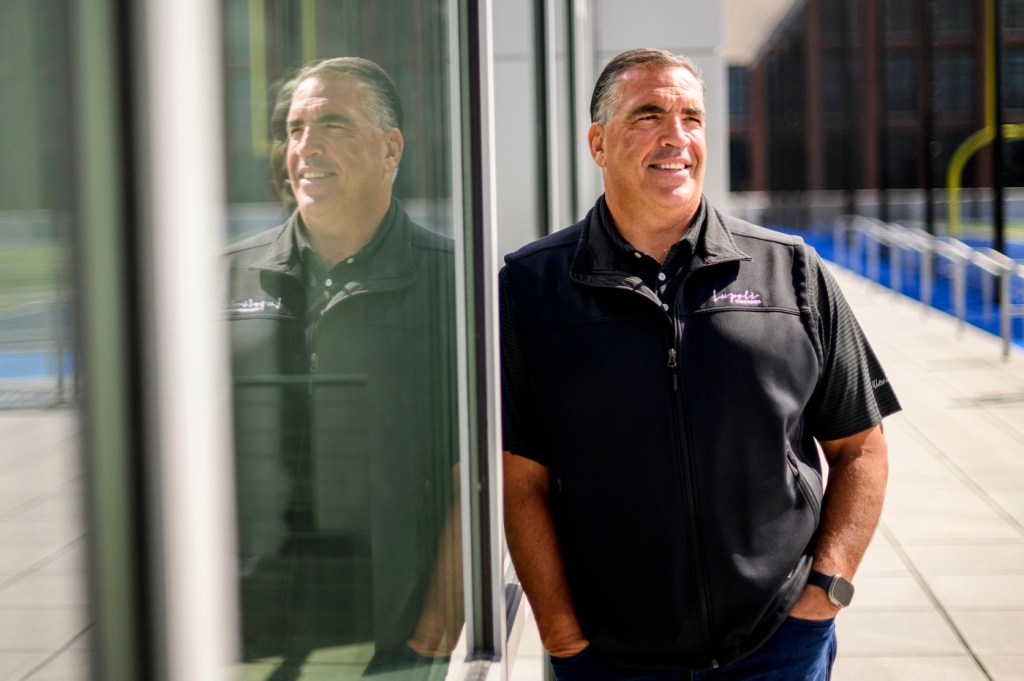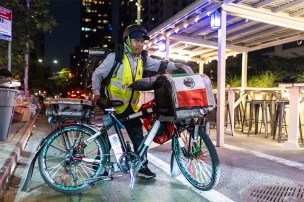Published on
How Sal built his empire on pizza
Sal Lupoli graduated from Northeastern with a dream to start his own business. From developing a business plan with his professors, he started Sal’s Pizza and then expanded his enterprise to become the state’s fourth-largest commercial developer.

Following graduation from Northeastern University in 1988, Sal Lupoli had dreams. Big ones.
But standing in his way was one, a lack of capital, and two, no knowledge of how to make pizza. So, during his last year studying business management at Northeastern, he took up an apprenticeship at a small family-run pizza shop in the North End.
Lupoli’s classmate, Phil McCabe, now chief of staff of Lupoli Companies, says his dream started during the last few years of college.
Lupoli went up to McCabe and their friends, saying that he was thinking about starting a pizza business and was talking to a few professors about it. He wanted his close friends to join him.
“We said, ‘Yeah, you like to eat pizza. We all like to eat pizza,” and we laughed at Sal, McCabe says.
But, in response, Lupoli told them, “No, I think I’m gonna make a run at this.”
When it came time to leave in the fall of ‘89, McCabe went to the North End to say goodbye to Lupoli before heading to the West Coast for a sales job. He was still trying to get him into the business with him.
“I left him on the cobblestone streets,” McCabe says. “He had flour from his head to his toes. … He still had that dream.”
Little did the two know that dream would turn into an empire. One that would include 120 locations that sell Sal’s Pizza, become one of the largest providers of fresh pizza to schools in New England and become the fourth largest commercial developer in the state. The development company owns and operates more than 6 million square feet of mixed-use property.
“He’s a kid that I would have bet on from day one,” says McCabe. “And I bet on myself too. But he took it that much further. … He laid all the money on the line he earned and then some. “Without doing that, he would have never built what truly is an empire.”
McCabe says he thought Lupoli would open six or eight pizza shops. Sal could have said he was content there. But he continued to build.
It wouldn’t be until three years after leaving Sal in the North End, when McCabe returned to the Northeast, that he would help Lupoli franchise his pizza business across the region.
“He’s the leader, he’s the captain, he’s the one that we follow,” says McCabe. “But, he’s built a great team around him.”
Humble beginnings
Lupoli was born in East Boston and came from a large family with six boys. At a young age, his family moved to Chelmsford, Massachusetts, where his family lived in a 900-square-foot house with one bathroom and two bedrooms. His parents used to sleep on the couch.
“I think that a humble beginning sometimes shapes the person that you become,” says Lupoli.
Originally, Lupoli planned on going to work after he graduated high school, as his three older brothers had. He remembers his brothers putting their paycheck on the refrigerator and whatever was left over after his mother took what was needed to support the family they could keep.
When Lupoli attended Chelmsford High School, a football coach asked if he would play.
“That opened up some wonderful doors,” says Lupoli.
Lupoli ended up getting a full athletic scholarship at Northeastern University. He was the football team captain and played for the first four years. In the last year of the five-year program, he was not eligible to play sports, so he focused on academics. The last year allowed him to think about what he would do once he graduated.
His father told him to follow his passion—real estate.
But there was a problem. When you buy real estate, you need equity. Equity was not something Lupoli’s family could give him.
His father urged him to use his last year to develop a concept and then run it by his professors. Once he operated that company, he could use that money to buy a piece of real estate and maybe someday become an operating company in real estate.
“I thought that was brilliant,” says Lupoli.
Lupoli didn’t want to open a restaurant because his father worked and owned a restaurant and he suffered a heart attack. Instead, his father suggested he research different types of food in the hospitality business, saying there are fast food, catering, wholesale production and quick-serve restaurants.
Lupoli decided on the pizza business because it fit what he was trying to do. Pizza shops can open up in small locations and it doesn’t go out of fashion.
“Pizza—really lasts the test of time,” says Lupoli. “Don’t forget; pizza was only the vehicle to help me buy real estate. It wasn’t like we had this extensive background. We really didn’t. I had no background at all.”
Another roadblock emerged. “I didn’t know anything about the pizza business,” says Lupoli.
After learning how to make and produce pizza in the North End, Lupoli returned to his professors, who pointed to his business plan.
Next step: opening a Sal’s Pizza location.
Sal’s Pizza emerges as a family affair
Lupoli’s father found a 780-square-foot storefront in Salem, New Hampshire. Lupoli says he sold his first car, and his father took out a third mortgage on the house to help finance it.
Lupoli said he was willing to pay 17% interest on the equipment he bought for the store.
“When you are broke, and you have no money—if you have a dream, you’re willing to sign and make a deal with the devil,” says Lupoli. “That’s what I did. I made a deal with the devil.”
“I said, ‘give me a chance to get open,’” says Lupoli.
The store was a family-run operation. It was about June of 1990 at the time, and two of his brothers, Sal and Nick, started construction on the small Salem, New Hampshire, pizza shop. They got a helping hand from their older brothers, , who had experience in construction.
In early ‘91, with pizza sales doing well, they began to look for a second location. Unfortunately, the management company of their first store went under, and the property was going to auction.
The brothers found a different location around the corner. The rent in their original site would have tripled if they had stayed.
At the time, times were tight, and there wasn’t a lot of working capital. So their father suggested that the company pursue wholesale opportunities, including getting into the school lunch program.
The first school district was in Timberlane, New Hampshire.
Nick remembers that they slept in the office of Sal’s Pizza because they were afraid that they wouldn’t be able to deliver their pizzas on time. The commute was only 20 to 25 minutes, but they wanted to make sure they would be there bright and early.
“The rest was history from there,” says Nick Lupoli, the vice president of hospitality at Lupoli Companies.
The two continued to serve the rest of the Timberland school system; before they knew it, other school systems started approaching them. Now, the company has over 400 schools throughout Rhode Island, Connecticut, Massachusetts and New Hampshire.
The pizza shops also snowballed.
“It seems like it all happened so quickly,” says Nick Lupoli.
Going into the business, the brothers had no idea how difficult the food business was in the sense that it takes a lot of labor. Both of them worked well over 100 hours a week.
“It was a lot of trials and errors, a lot of mistakes along the way,” says Nick Lupoli. “That’s the true definition of an entrepreneur.”
The two never stopped to ask what the big picture was. They never questioned that there would be a point when they stopped or slowed down.
“With a blink of an eye, it became we’re not doing it for ourselves anymore,” says Nick Lupoli. We’re doing it for everybody that’s in our circle. We’re doing it for our family members that are working. We’re doing it for our future family that we didn’t even have yet.”
After dealing with the rent with their first store, the two realized they had to enter the real estate business. As the company grew stronger, it began purchasing property to house the pizza shops.
“I call it acquisition of the dirt,” says Sal Lupoli. “Because the money’s in the dirt.”
Creating a real estate empire in unlikely places
After losing his father, Sal Lupoli decided to make the biggest bet yet.
“I signed everything and borrowed as much as I could to buy a building that was abandoned in Lawrence, Massachusetts, the poorest city in the state,” says Sal Lupoli.
He did it because he had a vision.
The company came to Lawrence in 2003. The company bought real estate that homeless people lived in, where the roof collapsed and trees were growing out of the building.
The Lupoli’s immigrated from Italy, says McCabe. It was immigrants who came and worked in Lowell, Lawrence and Haverhill.
“I think he would walk around the mills and be able to visualize, see the pictures of, how these immigrants would work in these mills, and that’s where they made their living, built up a foundation for their kids,” says McCabe.
When Lupoli was looking at these mills, at the decrepit buildings, McCabe says, it didn’t take long for him to start dreaming. “And that became a reality,” he says.
What Lupoli did at the Riverwalk, McCabe says, “is amazing.”
“We looked at Lawrence where other people saw the arson capital of the state, the insurance fraud capital in the state, the highest crime in the state, the lowest income per capita in the state,” says Lupoli. “We didn’t see that. We saw an opportunity to create economic development.”
The run-down mills have now become the Riverwalk Innovation District, home to a 50-acre mixed-use urban development comprising office and retail buildings. The Riverwalk Pavilion, the center point of the development, has a turf field on the top of the parking structure, which children from nearby schools use.
Lupoli Companies plans to continue to invest in these cities—Lowell, Haverhill, Littleton and their flagship Lawrence.
Projects include a 2.9 million square foot complex in Littleton, Massachusetts, which will include 800 apartments and 150,000 square feet of retail. In Lawrence, they are building 600,000 square feet of research and development, and will continue to expand on what they have. In Haverhill, they are rehabilitating Merrimack Street, including replacing the old, worn parking decks and adding hundreds of apartments, retail and office space.
Recently, Lupoli expanded his real estate buyings for personal use. He bought a state office building in the North End that once served the Summer and Callahan tunnels for $3.75 million, according to The Boston Globe. Lupoli will convert the building to a single-family house, bringing him back to initial roots in the North End.
The success Lupoli has seen, he attributes partly to Northeastern.
“Northeastern is near and dear to me,” says Lupoli. “Northeastern was a time in my life that really helped create the journey that I’ve been following for 33 years since I left.”
“If Northeastern didn’t give me the ability, or the opportunity to receive an athletic scholarship and to go to school for free…I honestly can say I’m not sure this company would be in the position it is today,” says Lupoli.
Despite the opportunities and brilliance that leaders such as Steve Jobs or Bill Gates showcase, Lupoli advises future entrepreneurs it will always be something other than the intelligence you possess that will make you successful.
“It will be sheer will that will make you successful,” says Lupoli. “If you have the will to succeed, then you will succeed.”
Lastly, Lupoli says, “If not you, then who? If not now, then when?”
Beth Treffeisen is a Northeastern Global News reporter. Email her at b.treffeisen@northeastern.edu. Follow her on Twitter @beth_treffeisen.





